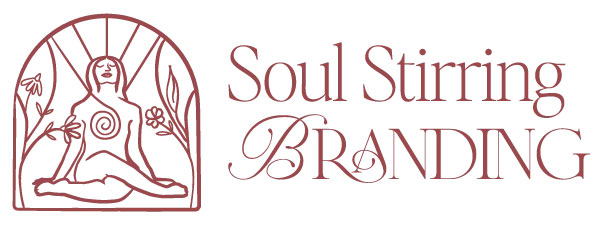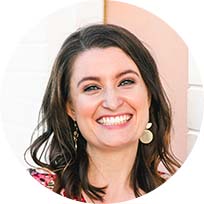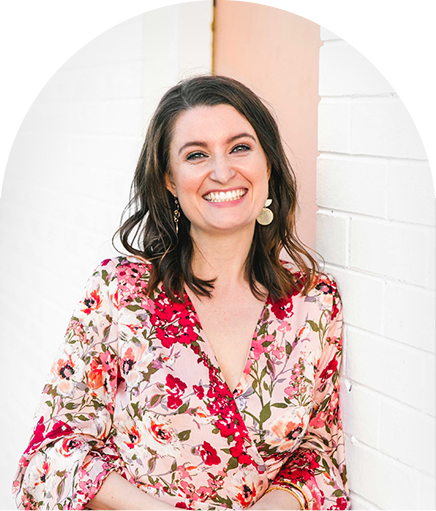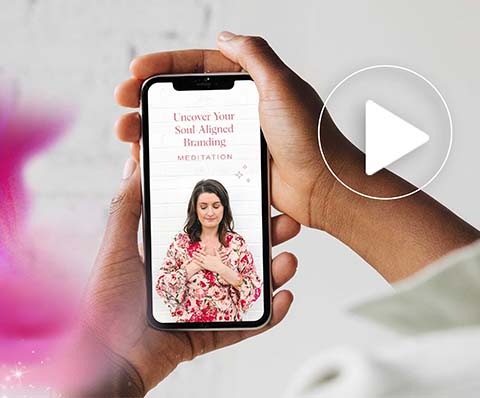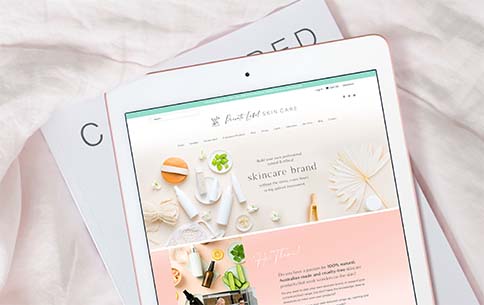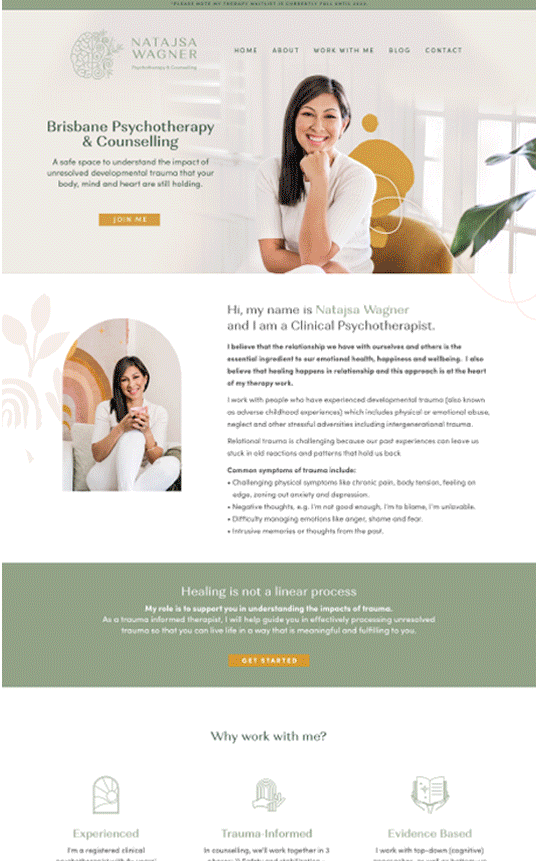With an estimated 71,000 life coaches worldwide, there is no doubt is a growing industry. While that’s great from the perspective of more people having access to coaching as well as more normalisation around having a coach, it also means it’s really hard to stand out in such a crowded marketplace. Because there isn’t any barrier to entry and anyone can start calling themselves a coach without any training or qualifications, it also means that there is a real mix in the calibre of coaching offerings online. This is something that can give the industry as a whole a bad rap. Because of the competitiveness and low barrier to entry, as a life or business coach you’ll need your brand to do the heavy lifting to ensure you a) differentiate yourself and b) convey your credibility in a powerful way.
Let’s go over some of my top tips.

How to differentiate yourself as a coach.
I believe the more competitive your industry, the more you’ll want to niche down.
So what exactly is a niche?
A niche is marketing yourself as having a specialisation within your industry. While it might appear counterintuitive at first to reduce your target market down to a smaller subset of people, having a niche is a powerful way to differentiate and stand out as an expert in your space.
Think about it this way: who would you rather have to help you with a medical problem?
A general practitioner or a specialist in your problem? There is a reason specialists charge a lot more and usually have big wait-lists. Because they are uniquely qualified to help you with your problem. The same goes for other industries too. People are definitely willing to pay a premium for someone who specialises in solving a specific problem and does this work day-in-day out for others, making them VERY good at what they do.
Not only will a niche help you command premium prices for your coaching business, it will also help you differentiate yourself as a coach and make people who have the specific problem you solve feel like you’re the ONLY coach they’ll consider. So it’s a win-win! I know you’re probably wondering, but wait! Will speaking to a really specific ideal client mean I get less business?
TRUTH: THAT’S YOUR SARCITY MINDSET TALKING

Remeber how I said that niched businesses are often the ones with wait-lists to work with them because it is a POWERFUL differentiating factor.
Also, remember, just because you narrow it in doesn’t mean you can only serve this very specific group of people. It just means you’ll be trying to tailor your language and content towards appealing specifically to this group. But if others are interested as well – great (just as long as you’re happy to serve them and you are definitely ok to turn away people you don’t believe are a good fit if applicable).
So what kind of coaching niches are there exactly? We’ll here’s a bit of a list to get you thinking…
- Life Coaching (note: this is more of a general umbrella term that could tehcnically cover all of the below areas and isn’t really a “niche” I would say)
- Busines coaching
- Health Coaching
- Grief Coaching
- Transformational Coaching
- Spiritual Coaching
- Relationship Coaching
- Parenting Coaching
- Creativity Coaching
- Teen and Young Adult Coaching
- Mid-Life Coaching
- Money/Mindset Coaching
Need some inspiration? Check out the fabulous Beautiful You Coaching Academy’s directory. They segment their coaches according to their niche so you can get real life examples right there to explore!
The above list has examples of
A) Niching by problem you solve – i.e. life, business, health, grief, spirituality, relationships, parenting, creativity
B) Niching by characteristics of your ideal client – i.e. teen and young adult coaching vs mid-life coaching, or womens coaching vs mens coaching (please note that being a coach for women is still an incredibly broad niche, so you’ll probably want to pair that with other attributes like you could be a grief coach for women who have lost a child. Now that’s specific!
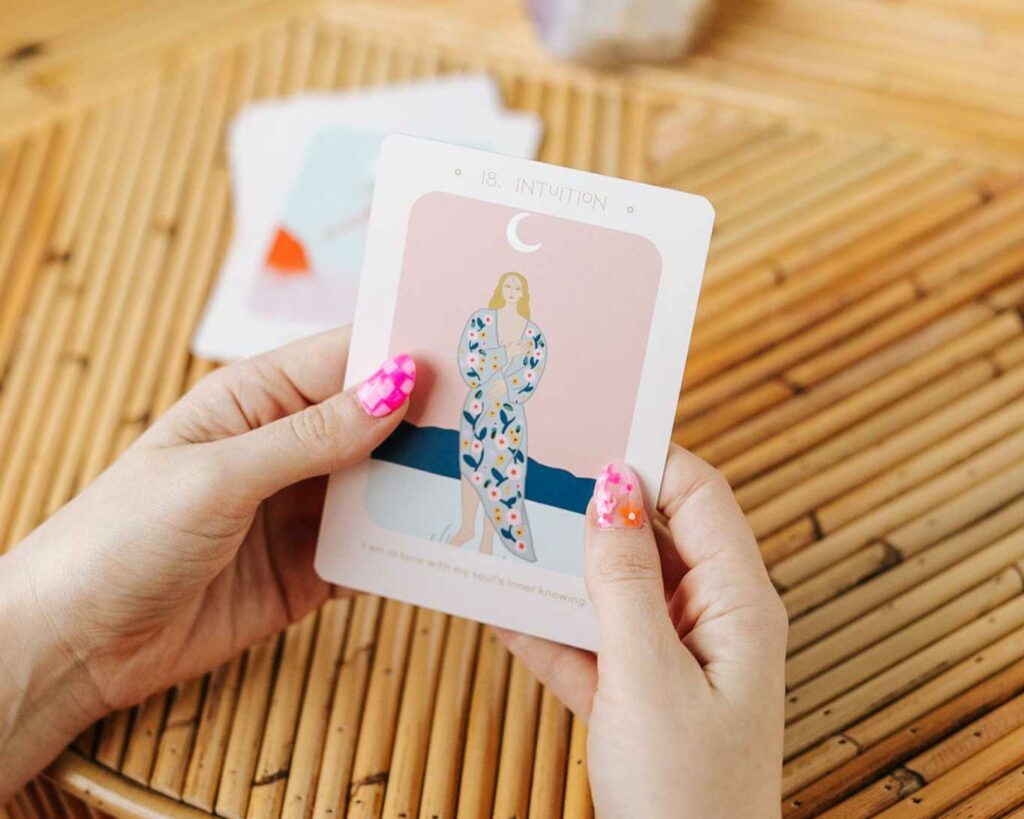
So how do you decide what your niche could be?
Well, I don’t think you should just pick any old niche for the sake of it. Most coaches I have worked with picked a niche based on their own lived experience which inspires them to do this work. So you’ll likely want to start there. Pick someting you can relate to, that you’re passionate about and that you could happily work with hundreds of people in without getting bored.
What happens if you don’t feel brave enough to explicitly niche yet?
There is something I call explicit and implicit niching.
EXPLICIT NICHING
is saying “I work with women” or “I work with teens” or “I work with mothers” – really spelling it out.
IMPLICIT NICHING
is where you use imagery that aligns with that ideal client. For example, all the stock photos on your site are of women, your colours are feminine, and your look is soft and romantic. I’ve done this for several clients who didn’t want to completely rule out working with men, but wanted their site is still calling in women with its look and feel.

Your personality and energy is your point of difference
Did you know sometimes it’s not about being the most highly qualified coach on the internet. A lot of the time it’s about having the kind of energy and personality that connects with your ideal client. You could be coaching the same way as hundreds of other people, but only you will have your unique vibe that will attract your perfect fit person and make them feel comfortable, inspired, uplifted and safe. This is so reassuring. It’s a permission slip to be exactly as you are. Gone are the days where we have to dress like we’re in corporate and take ourselves too seriously. You can be as casual or as sweary as you like. There are no rules! It’s just about making it clear in your branding from the get-go who you are so you invite people into your business world who love and accept all the parts of you. That’s what’s going to make it so much more fun to help your clients!
You might be a soft and compassionate coach for sensitive souls OR
You might be a bold, braze coach for go-getters who want tough love and a kick up the ass to get sh*t done.
Neither is right or wrong unless you’re trying to be someone you’re not. Remember, this will get super exhausting!! So you want to make sure there is alignment with the real you.
You then want to apply this personality and energy to EVERYTHING you do in your brand
I’m talking…
- The colours you choose should evoke that energy
- The clothes you wear and props you bring to your photoshoot
- The fonts you choose
- The style and themes of your graphic elements
- The stock photos you use
- The words you use in your copy and your overall tone of voice.Everything should speak to that personality niche. Remember that you only have 7 seconds for a person to land on your website and make a judgement about whether you’re likable, trustworthy and competent. People WILL judge your book by its cover (or in this case your website from it’s design). So you want to make sure it’s clear why you’re different from the get-go.

Your lived experience creates trust and connection
As I mentioned above, most coaches I’ve come across have a lived experience that guides them to do this work. This is another powerful way you can differentiate yourself from the sea of other coaches out there. For most coaches, they don’t have the same concerns as therapists around oversharing. There are no regulations in the coaching industry. So I find most coaches are more than willing to share their story with transparency and vulnerability.
Sharing these stories helps us connect emotionally to our audience. It makes them feel less alone. That’s why it’s so important that we share pieces of ourselves. Even if it feels a bit scary to be vulnerable, don’t be afraid to show your struggles as it is the thing that will make you feel relatable with your ideal client and actually build trust. I promise it won’t detract from your professionalism in any way. I know my favourite personal brands are the ones who share honestly about their journey – the good and the bad.
Have you heard that saying “Because right now, there is someone out there with a wound in the exact shape of your words.” That means there’s someone out there who has been through what you’ve been through. They too can relate to your words and they likely need to know their not alone. So is it worth more to help that person or to hold it all in?

Share your qualifications and credibility boosters
While I do believe that not everyone looking for a coach is necessarily solely focused on how many qualifications you have, it is still a great idea to show that you haven’t just woken up yesterday and decided you wanted to be a coach. You want to convey the fact that you have the experience and social proof people can trust.
This could look like:
- The number of clients you’ve helped (hundreds? thousands?)
- The qualifications you have
- the places you’ve been featured – media, podcasts, blogs, events etc
- Years of experience
- Awards you’ve won
- Great testimonials you’ve received
If you don’t have much “credibility” yet, don’t fret! Just make a mental note to start working up to those things. You can pitch to speak or write in the media/at events, apply for awards, start making requests for testimonials. Don’t beat yourself up if you don’t have everything from day 1 as that won’t be realistic!
